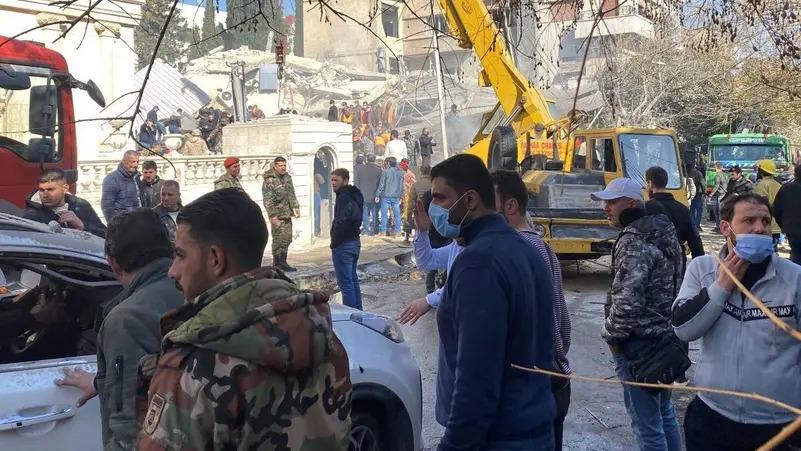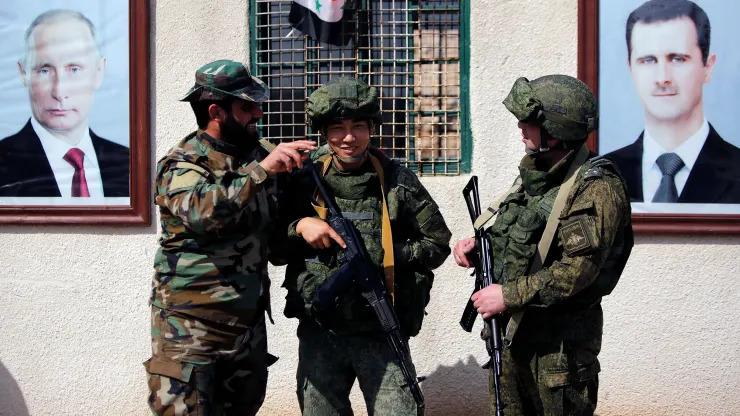Israel’s air strikes in Syria puts Iran under pressure Vengeance is must
On January 20, 2024, Israeli Air Forces conducted a precise attack that killed the Iranian Revolutionary Guards' intelligence chief for Syria and his deputy, as well as two other Guards. This comes barely a month after the most influential commander of the IRGC’s expeditionary Quds Force in the Levant lost his life in a similar incident.
While Israel has long attacked Iranian positions in Syria, the recent string of brazen assassinations and the seniority of the targets have raised questions about Iran’s deterrence strategy.
According to the Iranian media, the assassinated persons were identified as General Sadegh Omidzadeh, the intelligence deputy of the guard’s expeditionary Quds Force in Syria, and his deputy, who goes by the nom de guerre Hajj Gholam. Interestingly, the building that was hit by an Israeli missile belonged to the IRGC, and the area is known to be a high-security zone home to leaders of the IRGC and pro-Iran Palestinian factions.
Following this, the Iranian Foreign Ministry stated Tehran "reserves the right" to respond "in any way" while blaming arch-foe Israel for the "criminal act" and "violation of Syria's sovereignty and territorial integrity."
Israeli attacks on targets in Syria have been increasing in recent months, especially after the October 7 Hamas terror attack on southern Israel, and many of the Iranian commanders are plotting attacks on Israeli targets inside Israeli territory.

The ongoing Gaza war explicitly exacerbated the cross-border skirmishes between Israel, Syria, Lebanon, and Iraq. Moreover, an Israeli drone also targeted a vehicle in southern Lebanon in which two Hezbollah commanders were riding Saturday afternoon, destroying it.
Iranian and Syrian officials have long acknowledged Iran has advisers and military experts in Syria but denied there were any ground troops. Thousands of fighters from Iran-backed groups took part in Syria's conflict that started in March 2011, helping tip the balance of power in favour of President Bashar Assad.
The recent air strike was more than a simple coincidence, as just a month before, Israel conducted a similar air strike on IRGC staff based in Syria. The December air strike killed a senior Iranian general in Syria, Razi Moussavi. He was the most senior commander of the Quds Force to be killed outside Iran since a January 2020 US drone strike in Baghdad killed IRGC commander Qasem Soleimani.
Indeed, the ongoing Gaza war triggered sentiments of Muslims across the Middle East, heightening regional tensions and increasing pressure on Israel. As of today, 25.000 Palestinians were killed as a result of Israel's military campaign.
Unsurprisingly, Iran vowed retaliation following both attacks, killing high-profile military leaders, though Tehran and its proxy forces did not manage to conduct a decisive strike against Israel to prevent further potential air strikes in Syria and Lebanon.

In this vein, many experts argue that while tensions are rising, they are increasing in a “controlled” manner. Therefore, they argued, the odds of the Gaza war spreading are slim—for now. On the other hand, the continuation of the Gaza war had the potential to escalate current tensions and take the region to the point of explosion.
Iran's involvement in the Middle East geopolitical turmoil through its proxy forces threatens to destabilize the region further as Tehran recently flared up tensions with neighbouring Iraqi Kurdistan and Pakistan by perpetrating missile attacks, citing "Israeli presence" and "terrorist organization's activities along the border area." As a result, Baghdad has recalled its ambassador to Tehran and filed a complaint against Iran with the UN Security Council.
Nevertheless, the existing international mechanisms seemed insufficient to deter pro-Iranian proxy groups in Iraq, Syria, and the Red Sea. However, the growing volatility and risks of the new power gap went unnoticed in neighbouring Arab states, which abstained from taking sides in the current round of tensions. Saudi Arabia and the UAE, two main regional actors, limited their involvement by issuing official statements of concern.
Consequently, Iran's primary target in the region is the US troops stationed in Iraq and Syria. By conducting missile attacks and boosting the role of proxy forces, Iran aims to neutralize the US, thus eliminating support to Israel in its devastating war in the Gaza Strip. However, the Western partner's decisive support to Israel against the Hamas militant organization suggests that the end of the war is not on the horizon yet.








